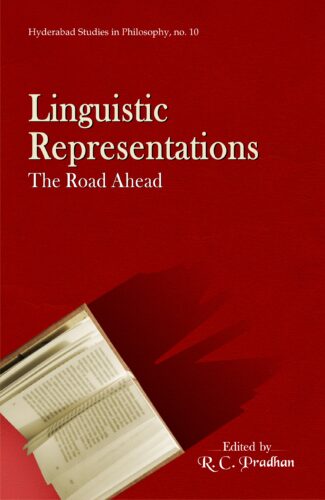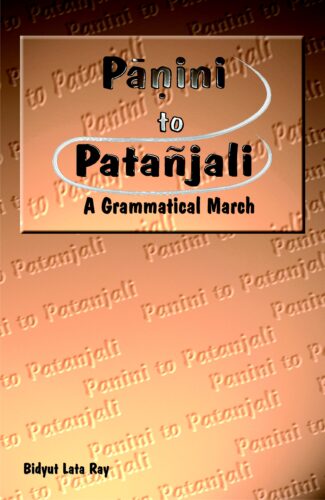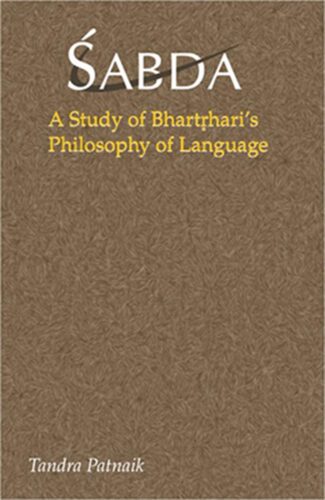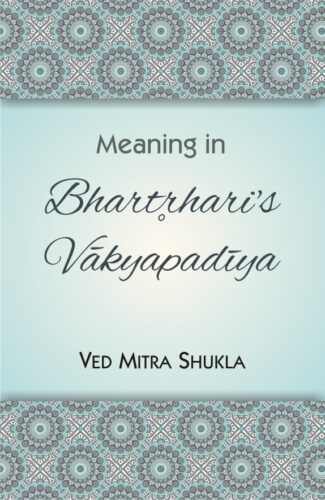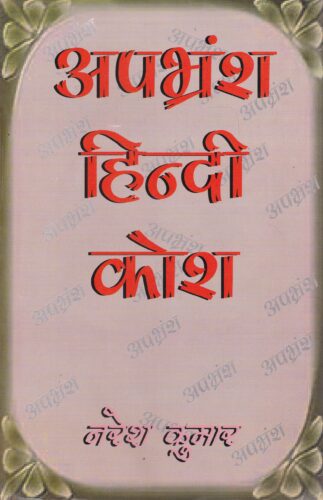

Apbharamsa Hindi Kos...
Apbharamsa Hindi Kosha
Apabhramsa-Hindi-Dictionary by: Naresh KumarThis Dictionary of Hindi Apabhramsa gives in detail the grammatical importance of words, their meanings, correct spellings, the alternate words and their various usages as mentioned by lexicographer Naresh Kumar.
₹1,500.00 Original price was: ₹1,500.00.₹1,350.00Current price is: ₹1,350.00.
ISBN: 9788124601365
Year Of Publication: 1999
Edition: 1st
Pages : xlv, 869
Language : Hindi
Binding : Hardcover
Publisher: D.K. Printworld Pvt. Ltd.
Size: 23 cm.
Weight: 1500
This Dictionary of Hindi Apabhramsa gives in detail the grammatical importance of words, their meanings, correct spellings, the alternate words and their various usages as mentioned by lexicographer Naresh Kumar.

- Sale!Linguistic Representations by: Ramesh Chandra Pradhan
₹990.00Original price was: ₹990.00.₹891.00Current price is: ₹891.00.The essays in this volume deal with the nature of linguistic representations as distinguished from other types of representations, including mental representations. These study language and linguistic representations, examining crucial questions like nature of language and language as a source of knowledge, accommodating linguistic representations within the broad framework of truth-based semantics and hermeneutic interpretation of language. The essays focus on the structure and limits of linguistic representations from both the Indian and Western perspectives. The semantic problems of meaning, reference and truth constitute the main issues facing any theory of linguistic representations and, therefore, these issues have been discussed in-depth. Besides, there has been an effort to understand how to locate the language-reality relationships within a broad representationalist framework. The essays take up many specific topics, examining theories of linguistic representations, such as the anti-representationalist stand of Wittgenstein and Derrida, Grice’s theory of meaning, and perspectives of Indian classical schools such as the Naiyayikas’ perspective on testimonial knowledge. The essays specially focus on the Indian theories of grammar and linguistic representations to highlight how philosophy of language, whether classical or contemporary, can hardly get rid of the semantic locus of meaning and truth.
The volume will prove invaluable to scholars of philosophy, especially those concerned with language and linguistic representations. - Sale!Sabdapramana by: Purushottama Bilimoria
₹750.00Original price was: ₹750.00.₹675.00Current price is: ₹675.00.Shabdapramana or Testimony is a formidable doctrine within Indian philosophy. A thorough investigation of this thesis is long overdue. What is shabdapramana (word as knowledge)? What is involved in hearing words? Is the understanding derived through hearing utterances direct or indirect? Does this peculiarly linguistic understanding (shabdabodha) amount to knowledge (prama), or does it depend on certain other conditions for its truth? Further, what sort of theories of meaning, understanding, and knowledge would be required to ground a successful shabdabodha as prama,> need careful attention. It is sometimes said that Indian thinkers had no particularly interesting theory of understanding. The present work sets out to address these issues issues that have engaged traditional and modern thinkers alike. Based on the classic text, Advaita Vedanta-paribhasha of Dharmarajadhvarindra (17th century), the analysis and arguments extend to the views of and criticisms from the Nyaya, Purva Mimamsa and the grammarian/linguistic schools within Indian philosophy, with a treatment of similar concerns in Western philosophy. There is a compelling thesis here that should be taken seriously in any philosophy. Long discarded as a distinct source of knowledge in Western philosophy, Testimony might be fruitfully re-examined. This could lead to mutual dialogue between philosophy and religion, and pave the way for critical metaphysics.
- Sale!Panini to Patanjali by: Bidyut Lata Ray
₹700.00Original price was: ₹700.00.₹630.00Current price is: ₹630.00.The book presents scholarly essays examining the origin and evolution of Sanskrit grammar in ancient India from the time of Panini to Patanjali. It focuses on the monumental works in Sanskrit grammar, the Ashtadhyayi of Panini, the Varttikas of Katyayana and the Mahabhashya of Patanjali and the impact of these on the Sanskrit grammatical tradition. The essays critically analyse the Paninian system of Sanskrit grammar: its style and technicalities and particularly technical terms and devices used in the Ashtadyayi. Discussing, chronologically, the systems of grammar that emerged after Panini, they study the style and system of the Varttikas and the unique contribution of Katyayana in incorporating the element of philosophy of language interpreting difficult words in the Ashtadyayi on the basis of philosophical doctrine. They enumerate the tradition and technique of Patanjali: the style, language, logic, semantics, and scientific interpretation of his sutras and emphasise the importance of the Mahabhashya as the basis of post-Paninian Sanskrit grammar systems. There are also discussions on the dates of Panini and Patanjali. Throughout, the authors refer and quote from the works of these masters and other ancient Indian texts as well as from commentaries and sub-commentaries, supplements, logical interpretations and arguments on their writings and the system of Sanskrit grammar. The volume will interest and benefit scholars and researchers on ancient Indian grammar and linguistics in particular.
- Sale!Sabda by: Tandra Patnaik
₹800.00Original price was: ₹800.00.₹720.00Current price is: ₹720.00.It is the first ever study of the fifth-century scholar, Bhartriharis Vakyapadiya in an altogether modern, the post-Fregean, perspective on the Philosophy of Language. A uniquely original thinker in Indias splendid grammarians tradition, Bhartrihari overreached the limits of language analysis set by his predecessors like Panini and Patanjali constructing, as he did, a brilliant Philosophy of Language that sought to spell out, among other aspects, the subtle distinctions between the knowable and the sayable, between what is said and what is meant, between the semantics of everyday speech and literary discourse. Sadly, Bhartrihari has, through the centuries, suffered neglect, largely because the Grammarian School never figured in the six major systems of traditional Indian philosophy.
For the first time, this monograph tries to reinterpret Bhartriharis position as a philosopher, emphasizing the high relevance of his Vakyapadiya to modern Western thought. A reputed scholar of grammar, philosophy and Sanskrit studies, the author presents Bhartriharis analyses of language methodically, unbiased. And, significantly, in contemporary philosophical idiom with contextual focus on the views of modern Western philosophers: Frege, Wittgenstein, Grice, Austin, Davidson, Searle, Strawson and the like. Also offered here is a lucid exposition of the Sphota Theory.
Growing from Dr Patnaiks a decade-long research on Bhartriharis philosophy, the volume highlights not only ancient Indian contribution to the study of language, but the interconnectedness among its indigenous approaches to linguistics, philosophy, logic and aesthetics as well. - Sale!Rated 5.00 out of 5Meaning in Bhartrharis Vakyapadiya by: Ved Mitra Shukla
₹650.00Original price was: ₹650.00.₹585.00Current price is: ₹585.00.The study of grammar and linguistic philosophy had its origin in the Vedic period, at least in the second millennium BCE. The Vakyapadiya of Bhartrhari, an authoritative Sanskrit text written in the fifth century CE, contains reflections on the subject matter of language and grammar, thus the philosophy of language. Interpretation of communication is one of the principal objectives of Bhrtrhari’s philosophy of language. His goal is to interpret the communication of all living things, be it a man or an animal, or a yogi or a baby. Bhartrhari represents a rich tradition of Indian philosophy of language that he inherited from Panini and Patatijali. The West, for all practical purposes, lagged behind in grammar, literary theories, philosophy of language and with the problems of meaning, even at the dawn of the twentieth century, when the Indian Grammarians made penetrating studies on the same even before the common era.



